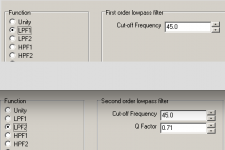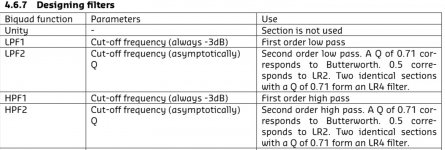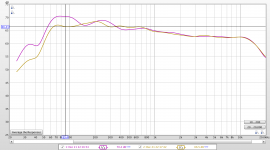Also in Hypex filter app there is no way of changing Q for a 1st order filter. Also, there is only a 1st and a 2nd filter option. By varying Q, you get Chebychev, Butterworth and LR etc. By cascading the 1st and 2nd filters and using Q where possible gives you all orders and shapes filters possible with electrical components as this is IIR. FIR is another ballgame - that screws with reality 🙂
Attchment 2: From DLCP manual re filters...
//
Attchment 2: From DLCP manual re filters...
//
Attachments
Last edited:
You should expect to have access to high/low, parametric, shelves, levels, polarity, delay. Simple but effective. They don't interact, so putting it all together can feel a bit like laying bricks ..add another filter, and another.. I thought VCad had all those, and biquads, I could be wrong.limitation
Just as a question, should you reverse polarity when using digital (hypex) second order Linkwitz Riley filters?
And can that be done digitally?
And can that be done digitally?
If they result in a true 2nd order LR transform of the drivers than yes, one driver should be inverted. I can't answer the second question, but if it is possible then I would think it is by introducing delay, which may not be desirable.
Tony.
Tony.
Using digital 2nd order Linkwitz-Riley filter does not necessarily results in an acoustical 2nd order LR slope. But if the results by applying (whatever) filters are acoustical 2nd order LR slopes and the driver's acoustical centers are in equal distance (or time aligned e.g. with DSP) to the listening (or measuring) spot then you need to flip polarity on one driver to get flat frequency response and maximal reinforcement from the interaction of the drivers on that (main) axis.
You can reverse the driver polarity by connecting reversed or can be digitally in the Hypex software. You get exactly the same results in both ways but imo the digital reversing are recommended to reduce future confusions (and just one click in the software).
You can reverse the driver polarity by connecting reversed or can be digitally in the Hypex software. You get exactly the same results in both ways but imo the digital reversing are recommended to reduce future confusions (and just one click in the software).
For Hypex, by ticking a box, a particular channels polarity may be reversed. I believe it's done in the digital domain.
//
//
Very clear answers.
I will time align the drivers by measuring it at the the listening position (that is better than at the measuring position for frequency response, right?)
To be sure, if I have bass, middle and tweeter, which polarities need to be inverted? I'm assuming just the mids.
And I can measure if the system behaves like an LR2 by just measuring the individual slopes right?
I will time align the drivers by measuring it at the the listening position (that is better than at the measuring position for frequency response, right?)
To be sure, if I have bass, middle and tweeter, which polarities need to be inverted? I'm assuming just the mids.
And I can measure if the system behaves like an LR2 by just measuring the individual slopes right?
Last edited:
Very clear answers.
I will time align the drivers by measuring it at the the listening position (that is better than at the measuring position for frequency response, right?)
To be sure, if I have bass, middle and tweeter, which polarities need to be inverted? I'm assuming just the mids.
And I can measure if the system behaves like an LR2 by just measuring the individual slopes right?
1. How would you do that? If you can do gated measurement at the listening spot then it's okay i think.
2. Invert the mid or the tweeter + woofer, it doesn't matter what you choose.
3. Right.
Last edited:
Under the circumstances I'm thinking it may be easier if you set the filters first, then apply delay to bring the phase into line.
Under the circumstances I'm thinking it may be easier if you set the filters first, then apply delay to bring the phase into line.
This.
Correct, this was my working methodUnder the circumstances I'm thinking it may be easier if you set the filters first, then apply delay to bring the phase into line.
This is not enough to make sure you are aligned at your listening position, if that is your plan.
Do you want to see if your measurements were valid to trust, or do you want to wait and measure it again later so you can adjust it then?
Do you want to see if your measurements were valid to trust, or do you want to wait and measure it again later so you can adjust it then?
slightly off-topic, but I have a question about connecting a tweeter to a hypex amp...
Assuming we are using a typical dynamic tweeter, such as a 28 mm dome. I read in some thread somewhere that people put a high value capacitor in series with the tweeter... something like 20 uF or so... Some people also put a small resistor (like 3 ohm) in series.
Any thoughts on this practice? I can understand the 20 uF cap as a safety precaution when developing the filter algorithms... but I don't see the value in leaving the cap in place permanently. And I see no value in the resistor.... however, I am open to the idea that it may improve the sound somewhat, even if we don't understand why (like so many things).
Thoughts?
Assuming we are using a typical dynamic tweeter, such as a 28 mm dome. I read in some thread somewhere that people put a high value capacitor in series with the tweeter... something like 20 uF or so... Some people also put a small resistor (like 3 ohm) in series.
Any thoughts on this practice? I can understand the 20 uF cap as a safety precaution when developing the filter algorithms... but I don't see the value in leaving the cap in place permanently. And I see no value in the resistor.... however, I am open to the idea that it may improve the sound somewhat, even if we don't understand why (like so many things).
Thoughts?
Caps like that are for cowards... 😉 Give the tweeter a chance!!
//
PS. A cap gives some amount of "protection" in case of DC or maybe some other events... but....
//
PS. A cap gives some amount of "protection" in case of DC or maybe some other events... but....
Crossover at 350 Hz and 2000 Hz
Measurment 1, 2 & 3: Linkwitz Riley 2nd order with inverted (digital) mid, smoothed lines.
LR23502000-Hz — imgbb.com
Measurement 4, 5 & 6: Linkwitz Riley 2nd order without inverted (digital mid), smoothed lines.
LR3502000-Hznoninvertmid — imgbb.com
Measurement 7, 8 & 9: Linkwit Riley 4th order
LR43502000-Hz — imgbb.com
Full sweeps:
LR2 with inverted digital mid
Full-Sweet3502000-LR2yes-invertmid — imgbb.com
LR2 without inverted digital mid
Full-Sweet3502000-LR2no-invertmid — imgbb.com
LR4 without inverted anything
Full-Sweep-LR43502000 — imgbb.com
Measurment 1, 2 & 3: Linkwitz Riley 2nd order with inverted (digital) mid, smoothed lines.
LR23502000-Hz — imgbb.com
Measurement 4, 5 & 6: Linkwitz Riley 2nd order without inverted (digital mid), smoothed lines.
LR3502000-Hznoninvertmid — imgbb.com
Measurement 7, 8 & 9: Linkwit Riley 4th order
LR43502000-Hz — imgbb.com
Full sweeps:
LR2 with inverted digital mid
Full-Sweet3502000-LR2yes-invertmid — imgbb.com
LR2 without inverted digital mid
Full-Sweet3502000-LR2no-invertmid — imgbb.com
LR4 without inverted anything
Full-Sweep-LR43502000 — imgbb.com
Last edited:
"Standard" span of y-axis level is 50 dB so that everyone can make an immediate grasp of whats going on 😉
//
PS: In my sofa... heavy smoothed...
//
PS: In my sofa... heavy smoothed...
Attachments
Last edited:
Well I got a nice plot with the settings LR2 (350 and 2000 Hz crossover) with inverse polarity on the mid and 100 us delay on tweeter and bass. All though the bass delay seems less logical, I've also build a preset with no bass delay.
This 100 us came from REW with a 1000 hz - 5000 hz short sweep with acoustic timing measurements and muting first base, then mid and and then both (for tweeter delay) and sweeping.
The overal result is great sound so far, outperforming no delays, no inversed polarities (at mid) with LR2 350/2000 Hz.
I still have to measure in Dirac live though.
This 100 us came from REW with a 1000 hz - 5000 hz short sweep with acoustic timing measurements and muting first base, then mid and and then both (for tweeter delay) and sweeping.
The overal result is great sound so far, outperforming no delays, no inversed polarities (at mid) with LR2 350/2000 Hz.
I still have to measure in Dirac live though.
- Home
- Loudspeakers
- Multi-Way
- Filter recommendation (using Hypex Software Design)


